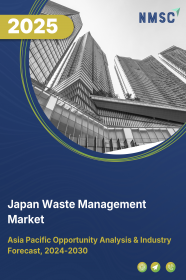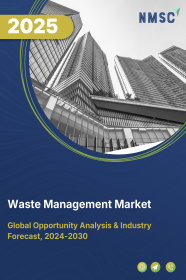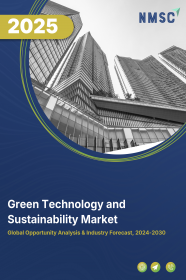
Japan Waste Management Market by Waste Type (Municipal Solid Waste (MSW) or Household, Industrial, and Commercial) and by Waste Treatment (Composting, Incineration, Controlled Landfill, Uncontrolled Landfill, Sanitary Landfill, Open Dump, and Recycling)– Opportunity Analysis and Industry Forecast, 2024 – 2030
Industry: Energy & Power | Publish Date: 17-Feb-2025 | No of Pages: 20 | No. of Tables: 82 | No. of Figures: 47 | Format: PDF | Report Code : EP1251
Japan Waste Management Market Overview
Japan Waste Management Market size was valued at USD 51.75 billion in 2023, and is predicted to reach USD 81.45 billion by 2030, at a CAGR of 5.6% from 2024 to 2030.
The Japan waste management market involves a wide range of services and activities aimed at managing and mitigating the impact of waste generated by various sectors including residential, commercial, industrial, and healthcare. It includes the collection, transportation, processing, recycling, and disposal of waste materials in a manner that is environmentally responsible and sustainable.
The market also involves the development and implementation of technologies and practices that promote waste reduction, resource recovery, and the safe handling of hazardous materials.
Key components of the waste-to-product market include waste collection services, recycling facilities, waste-to-energy plants, landfill operations, and environmental consulting services. As awareness of environmental issues grows, the waste-to-product market continues to expand, driven by growing population, technological advancements, and increasing public demand for sustainable waste solutions.
Growing Urbanization in the Country Propels the Growth of the Market
The growing urbanization in Japan propels the growth of the waste management market by increasing the demand for advanced waste-to-product solutions. As urban areas expand and populations concentrate, the volume of waste generated rises significantly, creating a need for efficient waste collection, sorting, and recycling systems.
According to the latest report published by the World Bank Group, Japan’s urbanization accounted for 92% of total population as compared to 79% of the total population in 2000.
This urban growth drives the adoption of innovative waste-to-product technologies and practices, further stimulating market development and ensuring that waste management infrastructure evolves to meet the needs of expanding cities.
Innovative Product Launches by Key Market Players Fuels the Market Growth
Innovative product launches by key market players further fuel the Japan waste management market growth. The introduction of cutting-edge technologies and solutions by leading companies drives market expansion by addressing evolving consumer needs and improving operational efficiency.
For example, in April 2024, Clariant introduced new solutions aimed at reducing the environmental impact of plastics during the Chinaplas 2024 event in Shanghai, China to enhancing safety, efficiency, and sustainability within the plastic industry.
These advancements enhance the effectiveness of waste management systems, such as more efficient recycling technologies and advanced waste-to-energy systems, thereby boosting market growth and setting new industry standards.
Complex Regulatory Environments Hinders the Growth of the Market
The complex regulatory environment, aimed at enhancing environmental protection, imposes significant operational burdens on waste management companies that hinders the market growth in the country.
Stricter environmental regulations, while essential for safeguarding natural resources and public health require waste-to-product companies to implement costly upgrades and adopt new technologies to comply with evolving standard that slows down the market growth.
The Adoption of Waste-To-Energy Technologies Creates Future Growth Opportunities in the Market
The adoption of waste-to-energy technologies such as incineration, anaerobic digestion, and gasification presents a significant growth opportunity for the waste management market as these technologies convert waste materials into usable energy, reducing landfill dependency and contributing to sustainable energy generation.
By transforming waste into a valuable resource, waste-to-energy solutions promote environmental sustainability and drive Japan waste management market expansion. This innovative approach aligns with global trends toward circular economy practices and offers economic benefits by generating energy from waste that creates a promising avenue for growth of the waste-to-product sector.
Competitive Landscape
The promising key players operating in the Japan waste management industry includes Asahi Holdings, Inc., DOWA Holdings Co., Ltd., JFE Engineering Corporation, Hitachi Zosen Corporation, Mitsubishi Materials Trading Corporation, Takuma Co., Ltd., Tokyo Environmental Public Service Corporation, Japan-Waste co, Ltd., Tsukishima Kikai Co., Ltd., Daisyo Kogyo, and others.
Japan Waste Management Market Key Segments
By Waste Type
-
Municipal Solid Waste (MSW) or Household
-
Food
-
Paper and Cardboard
-
Plastic
-
Glass
-
Metal
-
Others
-
-
Industrial
-
Manufacturing Waste
-
Construction & Demolition Waste
-
Agriculture Waste
-
Other Industrial waste
-
-
Commercial
By Waste Treatment
-
Composting
-
Incineration
-
Controlled Landfill
-
Uncontrolled Landfill
-
Sanitary Landfill
-
Open Dump
-
Recycling
Key Players
-
Asahi Holdings, Inc.
-
DOWA Holdings Co., Ltd.
-
JFE Engineering Corporation
-
Hitachi Zosen Corporation
-
Mitsubishi Materials Trading Corporation
-
Takuma Co., Ltd.
-
Tokyo Environmental Public Service Corporation
-
Japan-Waste co, Ltd.
-
Tsukishima Kikai Co., Ltd.
-
Daisyo Kogyo
REPORT SCOPE AND SEGMENTATION:
|
Parameters |
Details |
|
Market Size Value in 2023 |
USD 51.75 billion |
|
Revenue Forecast in 2030 |
USD 81.45 billion |
|
Value Growth Rate |
CAGR of 5.6% from 2024 to 2030 |
|
Analysis Period |
2023–2030 |
|
Base Year Considered |
2023 |
|
Forecast Period |
2024–2030 |
|
Market Size Estimation |
Billion (USD) |
|
Growth Factors |
|
|
Companies Profiled |
10 |
|
Customization Scope |
Free customization (equivalent up to 80 working hours of analysts) after purchase. Addition or alteration to country, regional, and segment scope. |
|
Pricing and Purchase Options |
Avail customized purchase options to meet your exact research needs. |

















 Speak to Our Analyst
Speak to Our Analyst



















